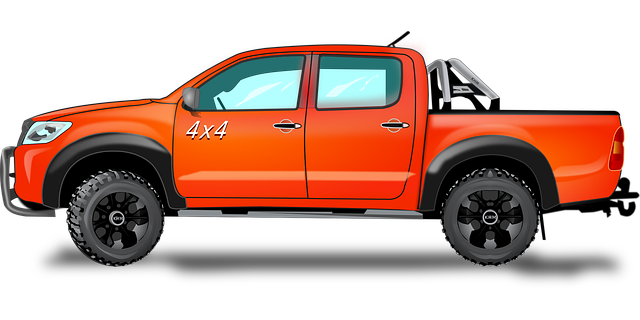4WD off-road driving mastery is crucial for confidently navigating challenging terrains. Regular maintenance of your vehicle's fluids and filters, including transmission, differential, coolant, brake, and steering fluids, as well as air, fuel, and oil filters, is essential to ensure peak performance and prevent mechanical issues. Additionally, inspecting hoses, belts, connections, tire pressure, and tread depth are important tasks that can help preempt potential problems on off-road trips. Mastery of 4WD off-road techniques, combined with a comprehensive emergency kit and recovery gear, not only enhances your vehicle's performance and reliability but also equips you to handle any situation you might encounter on the trail. This ensures a safer, more enjoyable off-roading experience.
4×4 enthusiasts know that off-road adventures demand more than just a vehicle capable of handling rugged terrain; it requires meticulous maintenance and understanding of the vehicle’s intricate systems. This article delves into the essential aspects of routine care for off-road vehicles, ensuring your journey remains unhindered by mechanical mishaps. From mastering 4WD off-roading techniques to regular checks on tires, suspension, and drivetrain components, we’ll guide you through maintaining the heart of your off-road machine. Stay informed on fluid levels, filter replacements, and the importance of carrying emergency kits and recovery gear to navigate the unpredictable nature of off-road travel.
- Understanding Your 4WD System: An Introduction to Key Components and Maintenance Needs
- Tire Care and Selection for Optimal Off-Road Performance
- Regular Inspection and Upkeep of Suspension and Drivetrain Components
- Fluids, Filters, and Frequent Checks: The Lifelines of Your 4WD's Reliability
- Preparing for the Unpredictable: Emergency Kits and Recovery Gear Essentials for Off-Roaders
Understanding Your 4WD System: An Introduction to Key Components and Maintenance Needs

4×4 vehicles are marvels of engineering designed to traverse challenging terrains with finesse. Mastering off-road techniques is essential, but understanding your vehicle’s 4WD system is equally critical for safe and effective adventure. The 4WD system comprises key components such as the transfer case, front and rear driveshafts, differentials, and the electronic control systems that manage power distribution. Regular maintenance of these parts ensures they function optimally under the strain of off-road conditions.
To maintain your 4WD system in top condition, it’s imperative to perform routine checks and services. This includes inspecting and replacing fluids—such as the transmission fluid and transfer case fluid—according to the manufacturer’s specifications. These fluids cool and lubricate vital components, preventing overheating and wear during off-road excursions. Additionally, checking the drive shafts for excessive play or damage is crucial, as is ensuring the differentials are functioning correctly. Regularly inspecting the driveline angles and components for misalignment or damage can prevent costly repairs down the line. By understanding the inner workings of your 4WD system and committing to a maintenance schedule, you’ll enhance your vehicle’s reliability and performance on the trail. This knowledge empowers off-road enthusiasts to tackle rugged landscapes with confidence, mastering 4WD off-roading techniques in conjunction with a well-maintained vehicle.
Tire Care and Selection for Optimal Off-Road Performance

When it comes to off-road performance, tire care and selection are paramount for mastering 4WD off-roading techniques. The terrain you encounter off the beaten path can vary widely, from mud and sand to rocks and ruts, each demanding a different approach and tire characteristics. To ensure optimal traction and durability, your tires must be well-suited to the specific conditions you anticipate. All-terrain tires are designed with a balance of on-road comfort and off-road capability, featuring aggressive tread patterns that provide superior grip across multiple surfaces. They offer larger shoulder blocks for enhanced cornering stability, and deeper treads to help evacuate mud, snow, and sand from between the tire and the ground. Additionally, reinforced sidewalls protect against punctures when navigating sharp rocks or other debris.
Regular maintenance of your off-road vehicle’s tires is critical for safety and performance. Before each outing, check tire pressure and adjust to the recommended level for optimal traction and fuel efficiency. The correct air pressure not only helps prevent damage from excessive heat due to overinflation but also ensures better contact with the ground, which is crucial for maintaining control in challenging conditions. Regularly inspect your tires for wear, damage, or any foreign objects embedded in the tread, as these can compromise both performance and safety. Rotating your tires according to a schedule appropriate for your driving habits will also extend their lifespan and maintain even wear across all four tires. Mastering 4WD off-roading techniques is not just about the vehicle’s capabilities; it’s equally dependent on the performance and upkeep of your off-road tires.
Regular Inspection and Upkeep of Suspension and Drivetrain Components

Regular maintenance and thorough inspection of a vehicle’s suspension and drivetrain are pivotal for off-road enthusiasts who demand reliability and performance in challenging terrains. The suspension system, which includes shocks, springs, bushings, and control arms, is subjected to extreme stress during off-road excursions. Consistent checks should be performed to ensure these components maintain their integrity; otherwise, they may compromise the vehicle’s stability and handling, potentially leading to accidents or vehicle damage. Drivetrain components, such as differentials, transfer case, driveshafts, and transmissions, also require diligent upkeep. These parts are responsible for transmitting torque and power to the wheels, enabling traction and maneuverability on rough surfaces. Regular servicing includes inspecting and replacing fluids, checking for leaks, and ensuring all connections and joints are secure. Mastering 4WD off-road techniques is not solely about skillful driving; it’s equally about maintaining the vehicle to withstand the rigors of off-road terrain. This proactive approach to maintenance minimizes the risk of unexpected failures, enhances safety, and maximizes the lifespan of your off-road vehicle. By understanding the importance of these components and implementing a regular inspection schedule, off-roaders can confidently navigate diverse landscapes with greater control and assurance.
Fluids, Filters, and Frequent Checks: The Lifelines of Your 4WD's Reliability

Regular maintenance of your off-road vehicle’s fluids, filters, and components is paramount to ensuring its reliability on rugged terrain. Fluids are the lifeblood of any 4WD system; they facilitate smooth operation by transmitting power from the engine to the wheels, transferring heat away from critical components, and maintaining hydraulic pressure in braking systems. To keep your vehicle performing optimally, it’s essential to regularly check and replace fluids such as transmission fluid, differential oil, coolant, brake fluid, and steering fluid. These fluids can degrade over time or with use, losing their effectiveness, which can lead to mechanical failures in the most challenging conditions.
Equally important are the filters in your off-road vehicle. Air, fuel, and oil filters play a crucial role in maintaining engine performance. A clean air filter ensures that your engine breathes efficiently, which is vital for power and performance, especially when navigating dusty or muddy trails. Fuel filters prevent contaminants from clogging the fuel lines, ensuring a consistent fuel supply to the engine. Oil filters remove impurities from your engine oil, keeping the motor oil clean so that it can effectively lubricate, cool, and clean the engine’s moving parts. Regular inspections and replacements of these filters can prevent deposits and blockages that could otherwise compromise your vehicle’s off-road capabilities.
Frequent checks are an integral part of maintaining the reliability of your 4WD. Regularly inspecting hoses, belts, and connections, as well as checking tire pressure and tread depth, can prevent many common issues faced during off-road excursions. Mastering 4WD off-roading techniques is only one aspect of ensuring a successful trip; the mechanical integrity of your vehicle is equally important. By understanding the roles of various fluids and filters, and by checking them often, you can significantly enhance your vehicle’s performance and reliability in the unpredictable environments that off-road driving demands. This proactive approach to maintenance will not only safeguard your adventure but also extend the lifespan of your vehicle, allowing you to tackle any terrain with confidence.
Preparing for the Unpredictable: Emergency Kits and Recovery Gear Essentials for Off-Roaders

Embarking on off-road expeditions often means venturing into environments where unpredictability is the only certainty. Off-roaders must be prepared for a myriad of scenarios, from minor mishaps to major mechanical failures. A fundamental aspect of this preparation involves packing comprehensive emergency kits and recovery gear. These tools are not just about adherence to safety protocols; they are lifelines that can make the difference between a manageable situation and one that escalates into danger.
A well-stocked emergency kit should include essential items such as first aid supplies, a multi-tool, a fire extinguisher, and weatherproof matches or a fire starter. It’s equally crucial to have recovery gear on hand, which typically consists of a high-quality winch, a set of recovery straps, shackles, and a snatch block. Additionally, mastering 4WD off-road driving techniques is paramount for maneuvering through treacherous terrains. Understanding the dynamics of four-wheel drive systems allows off-roaders to optimize traction and maintain control over their vehicles in challenging conditions. By combining these technical skills with the right gear, off-road enthusiasts can navigate with confidence, knowing they are equipped to handle whatever the wilderness throws their way.
Off-road enthusiasts and seasoned adventurers alike understand that the reliability and performance of their off-road vehicles are paramount for a successful expedition. This article has outlined the critical aspects of maintaining your 4WD to ensure it stands up to the rigors of off-road terrain. From comprehending the intricacies of your vehicle’s 4WD system to the strategic selection and care of tires, regular inspection of suspension and drivetrain components, and attentive management of fluids and filters, every detail is crucial for maintaining peak performance and safety. Additionally, being prepared for emergencies with the necessary recovery gear can make the difference between a memorable adventure and an unplanned one. By mastering 4WD off-roading techniques and adhering to a routine maintenance schedule, off-roaders can confidently traverse any terrain they encounter. Remember to stay vigilant and keep your vehicle in top condition for an uninterrupted journey off the beaten path.
